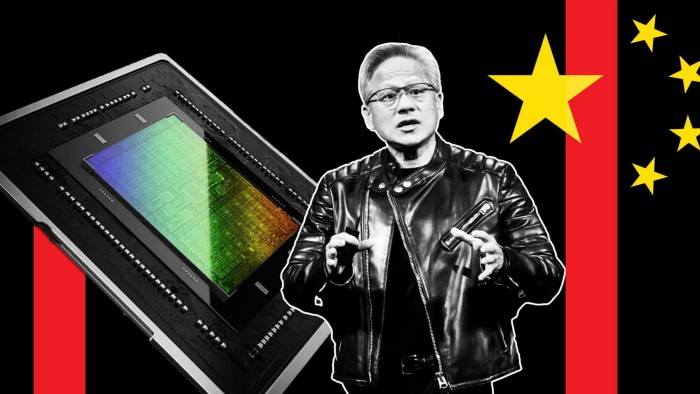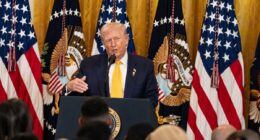Share this @internewscast.com
Unlock the Editor’s Digest for free
Nvidia is preparing to release a new AI chip tailored specifically for China, possibly by September. CEO Jensen Huang is expected to visit the country to emphasize the company’s dedication to the region.
This chip is a variant of Nvidia’s Blackwell RTX Pro 6000 processor, adjusted to comply with stricter export regulations imposed by former US President Donald Trump, as per insiders familiar with the matter.
The chip will lack some of the more advanced features, like high-bandwidth memory (HBM) and NVLink, which are used to enhance connectivity for quicker data exchanges.
Huang planned to meet top Chinese leaders as he attends the International Supply Chain Expo in Beijing starting next Wednesday, people familiar with his schedule said.
The chips group on Wednesday became the first company to hit a $4tn market capitalisation. The stock took a knock earlier in the year when the US tightened export controls but has recovered thanks to investor enthusiasm for the global AI market opportunity and improving US-China relations.
Huang has stepped up his efforts to play a more diplomatic role with Chinese and US leaders, as Nvidia has become caught in the middle of a geopolitical conflict while trying to retain a position in a crucial overseas market.
Nvidia’s chief is seeking talks with China’s premier Li Qiang, according to one of the people. Li would be the most senior Chinese official he has met to date.
A meeting with vice-premier He Lifeng, whom he previously held discussions with in a visit to China in April, is also being planned. Schedules are not yet finalised and still subject to approval on the Chinese side, the person added.
Speaking at the Computex tech show in Taiwan in May, the CEO condemned US export controls aimed at limiting China’s access to AI chips as “a failure”.
He said they had inspired Chinese companies to accelerate the development of their own AI products. Nvidia’s market share had slipped from 95 per cent four years ago to 50 per cent, he lamented. The company says it could be competing in a China AI market worth $50bn in the near future.
Huang is expected to reaffirm Nvidia’s commitment to the Chinese market in the face of multiple rounds of export restrictions that have caused it billions of dollars in lost business.
Sales of the new product will not commence before September, as Nvidia sought assurances from the Trump administration that it would not be found in breach of new export restrictions and banned shortly after its introduction, said one person with knowledge of the plans. The chip’s specifications could still change depending on the outcome of discussions with Washington.
However, Nvidia’s clients in China have been testing samples of the chip and expressed interest in significant orders, according to the two people with knowledge of the company’s plans.
Although its performance does not compare with top-of-the-line products from Chinese rivals, clients are willing to buy because a shift away from Nvidia’s Cuda software system to others would significantly increase operating costs.
Demand for the chip is not expected to be as high as for its previous product, the H20, which was in effect banned in April prompting Nvidia initially to take a $5.5bn writedown.
Chinese clients have grown concerned about the risk of relying too much on Nvidia products amid US policy uncertainties, according to people close to their thinking. Leading AI players, including Alibaba, ByteDance and Tencent, have been testing alternatives from local producers.
Launching a new China product and ensuring uninterrupted delivery would require building a large inventory, posing financial risks to Nvidia if export policies remain uncertain.
China is Nvidia’s fourth-largest market, with a revenue base of $17.1bn and accounting for 13 per cent of its total sales, according to its annual report for the 2025 fiscal year.
An Nvidia spokesperson declined to comment on any China-specific chip redesign plans.
“China has one of the largest populations of developers in the world, creating open-source foundation models and non-military applications used globally,” they said. “While security is paramount, every one of those applications should run best on the US AI stack.”
China’s state council and the council for the promotion of international trade did not immediately respond to requests for comment.
Additional reporting by Eleanor Olcott in Shanghai and Michael Acton in London







